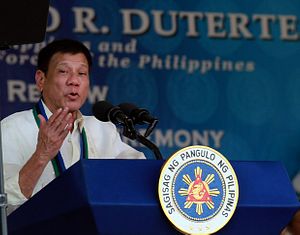Philippine President Rodrigo Duterte will pay whirlwind visit to Cambodia, and a two-day visit to Hong Kong before heading to Beijing for the high-profile “Belt and Road” summit this week.
Duterte will visit Cambodia for one day to attend the World Economic Forum (WEF) in Cambodia where he will, as current chair of the Association of South East Asian Nations (ASEAN), pitch his economic agenda to 700 leaders from business, government, and civil society groups, according to Acting Foreign Affairs Spokesperson Robespierre Bolivar.
Following Cambodia, he will fly to Hong Kong, where he is scheduled to meet Filipino citizens living and working in the city. It will be Duterte’s first visit to Hong Kong, where more than 210,000 Filipinos live, the majority of whom work as foreign domestic helpers.
CY Leung, the current chief executive of Hong Kong, has been urged to meet with the Philippine president to discuss the case of four Hong Kong fisherman who were arrested for operating a floating drug lab in the country last year. However, Robert Quintin, the Philippine vice consul in the city, told South China Morning Post that Duterte was unlikely to meet any Hong Kong officials during his short visit.*
Also according to SCMP:
A [Hong Kong] police source said the force would enhance security for Duterte, who has been vocal on dealing “harshly” with terrorism. The source said that given concerns about global terrorism, there were high security risks surrounding the leader’s visit.
“The country itself is facing problems with terrorism,” the police source continued, referring to terrorist group Abu Sayyaf. “Elite personnel from the VIP protection, counterterrorism response, and special duties units will be deployed to protect the president during his stay.”
When he visits Beijing for the Belt and Road Summit, it is widely believed that Duterte will push aside issues relating to South China Sea sovereignty, and instead try to persuade China to help fund improvement works on the Philippines’ crumbling infrastructure.
The Duterte administration has launched a three-year program, with an estimated budget of $72 billion, to build and upgrade infrastructure in the Philippines by 2020. The projects range from transport infrastructure to water resources, sewerage, and flood management. Some of that program overlaps with China’s pledged $15 billion in investment in the Philippines, including a railway and a hydroelectric dam.
*A previous version of this story did not properly cite the South China Morning Post article. The Diplomat regrets the error.

































